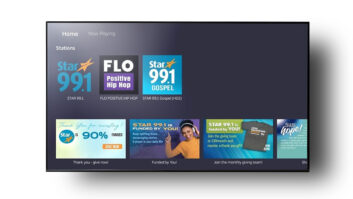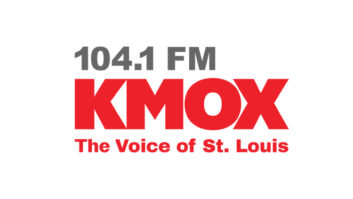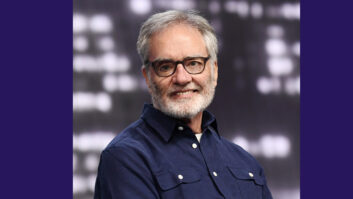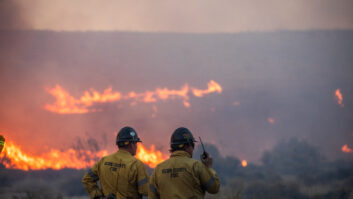(click thumbnail)AFN announcer Sgt. Harry LytleDuring World War Two, the Armed Forces Radio Service “may well stand as the highest expression of American broadcasting.” That was the view of one of the leading figures in the broadcasting world.
From 1942 it put out hundreds of hours of programs unrivalled for quality, as all the top stars in America gave their services free “for the boys over there.”
As well as direct broadcasts, it produced over a million disks that were distributed to its offshoots all over the world, wherever American men and women were serving. The biggest of those was the American Forces Network.
From 70 broadcasting stations in the United Kingdom it transmitted programs from July 4, 1943, to Dec. 31, 1945, when it finally moved to Germany. Its intended audience: the many thousands of American troops pouring into Britain for the invasion of Nazi-occupied Europe and servicing the vast air armada carrying out the great offensive against Hitler’s Germany.
Surviving AFRS programs can be numbered by the hundred — “Command Performance,” “Mail Call,” “GI Jive” and many others. Yet of the 2-1/2 years of AFN daily output, less than an hour is known to have survived.
Of course a great deal of its output consisted of rebroadcasts of AFRS programs. There were also a number of record programs that it would be pointless for the broadcasters themselves to record; and listeners would be unable to record at all because in the days before audio tape only professional equipment was capable of recording radio broadcasts.
Nevertheless AFN originated a number of its own programs and it is surprising not one of these has survived.
No open
AFN’s own archives have no material from the war years, nor does the BBC Sound Archives, with two brief exceptions. A dwindling number of AFN personnel who survived from the war years have nothing.
Syl Binkin, the first man to put AFN on the air on the Fourth of July 1943, kept some recordings from those days that he hung on to for years; but they vanished in a move, never to be seen (or heard) again.
(click thumbnail)Johnny Kerr, presenter of ‘Duffle Bag,’ works with BBC announcer Margaret Hubble on the AEFP in a photo taken from the BBC Year Book in 1945. Hubble recently passed away but I have not been able to learn about Kerr’s life after the war.There is any amount of material from AFN’s long stay in Germany, but from the 2-1/2 years in wartime London, virtually nothing. It is particularly surprising that AFN’s opening broadcast, an historic event in broadcasting history, was not recorded or, if it was, has vanished. The various institutions in the States that hold audio recordings of all kinds have a wealth of wartime programs but of AFN output, not so much as a station ident. It was the same story at the German national sound archives and other broadcasting archives on the Continent.
A few brief fragments of AFN’s final day of broadcasting in the United Kingdom on Dec. 31, 1945, have come to light. But the source for these is something of a mystery. It is understandable that AFN’s final program in Britain should be recorded for posterity, presumably by AFN itself. But why only a few disjointed fragments have survived is puzzling.
Another oddity is that the BBC, which at first resisted the creation of AFN, later got on so well with the broadcasting “intruder” that it transmitted a special tribute, “Farewell AFN,” in peak listening time. No recording of that program can now be found.
There is one other possible source for AFN program material, and that is the “Allied Expeditionary Forces Program,” or AEFP. This was set up at the insistence of General Dwight Eisenhower, who commanded the great army that was soon to invade Europe. He wanted one single broadcasting station that would send the same message to all the thousands of servicemen taking part in D-Day and beyond.
AEFP
The BBC strongly opposed the idea and so did AFN, which was perfectly happy with the way things were — Yanks and Brits doing their own thing in their own way.
(click thumbnail)Unknown sergeant from the war years.Ike was furious. AFN, a military outfit, could be ordered to toe the line, but not the BBC. Finally Eisenhower went to the top and took the matter to Winston Churchill, who had no choice. He told the BBC to stop arguing and get on with it. And so the AEFP came into being.
In the event, it proved a remarkably successful program. Over half its output came from AFN and its lively, informal style was adopted as the way the program was presented on the air. The BBC has 10 AEFP programs in its Sound Archives but all are clearly combined efforts and not the individual programs that were special to AFN’s output.
There are just the briefest fragments in the Archives of two of AFN’s own most popular record shows: Johnny Kerr introducing “Duffle Bag” — voted their favorite listening ahead of all the star-studded programs from Hollywood by 72 percent of U.S. service listeners — and George Monaghan introducing “On the Record,” another much-loved show.
Sad that so little remains of what so many listened to with such enjoyment.
AFN London gave pleasure to many thousands of American servicemen and women during the war, as well as 5 million Britons who tuned in regularly, though they were in effect eavesdroppers. Like a shooting star it shone brightly and briefly, then vanished almost without a trace. But its successor, AFN Germany, glows in the broadcasting firmament still.
In a journalistic career extending more than 40 years, Patrick Morley worked in newspapers in Britain before joining the BBC, where he held senior posts in radio and television news. He wrote the first news story to be broadcast in Britain on the assassination of President Kennedy. He has been listening to AFN since 1944; upon retiring he wrote its history, “This is the American Forces Network,” published under the Praeger imprint by Greenwood Publishing 2001. E-mail him at [email protected].
(click thumbnail)Another photo from AFN shows young men, probably at one of the studios in Germany in the years immediately after the war. I have not been able to establish who they are, where or when.For those interested in this topic, also try “Brass Button Broadcasters” by Trent Christman, Turner Publishing, 1993; “Star Spangled Radio” by Edward M. Kirby and Jack W. Harris, published by Ziff Davis, 1948; and “Tune Into Yesterday,” the journal of the Old Time Radio Program Collectors’ Association (e-mail [email protected]).











